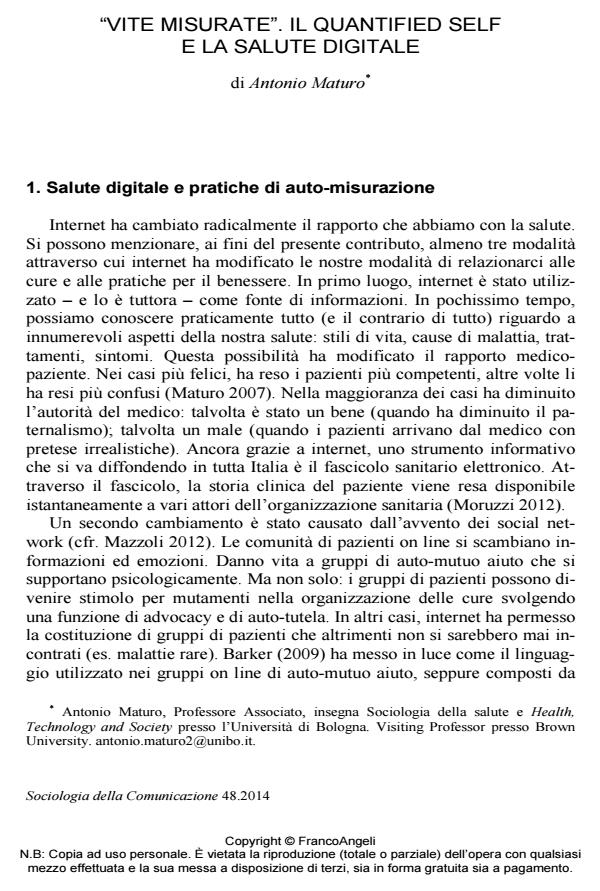Measuring Life. The Quantified Self and Digital Health
Journal title SOCIOLOGIA DELLA COMUNICAZIONE
Author/s Antonio Maturo
Publishing Year 2014 Issue 2014/48
Language Italian Pages 8 P. 60-67 File size 132 KB
DOI 10.3280/SC2014-048006
DOI is like a bar code for intellectual property: to have more infomation
click here
Below, you can see the article first page
If you want to buy this article in PDF format, you can do it, following the instructions to buy download credits

FrancoAngeli is member of Publishers International Linking Association, Inc (PILA), a not-for-profit association which run the CrossRef service enabling links to and from online scholarly content.
The apps for self-tracking are increasingly popular among the population. In many cases, the Quantified Self has given raise to changes of habits and behaviors that have resulted in health gains. Moreover, through a smart phone it is possible to share biometric data on the cloud and have them sent to doctors. Therefore, the digital health practices can increase patient empowerment and reduce health expenditure. Among the disadvantages, this trend brackets the importance of social determinants of health. Also, it provides an account of an individual without any social ties. Lastly, it can lead to stigmatize whoever do not share his/her own data in the social.
Keywords: Quantified Self, Self Tracking, sociology of health, social determinants of health, digital health, Morozov
- Moruzzi M. (2012), Alta comunicazione. Aziende, fascicoli elettronici, emozioni e dematerializzazioni, FrancoAngeli, Milano.
- Rabinow P. (1996), Anthropology of Reason, Princeton U.P., Princeton.
- Rose N. (2007), Making Time: On the Anthropology of the Contemporary, Princeton U.P., Princeton.
- Wolf G. (2010), The Data-Driven Life, «The New York Times – Sunday Review», May 2nd.
- Barker K. (2009), Gruppi di sostegno telematici, pazienti-consumatori e medicalizzazione: il caso delle patologie controverse, «Salute e Società», a. VII, Suppl. n. 1, pp. 179-202.
- Cipolla C. (2013), Perché non possiamo non essere eclettici. Il sapere sociale nella web society, FrancoAngeli, Milano.
- EC (European Commission) (2014), Green Paper on Mobile Health.
- Gibbon S., Novas C. (2008), Introduction, in Gibbon S., Novas C. (eds.), Biosocialities, Genetics, and the Social Sciences. Making biologies and the identity, Routledge, Oxon.
- Gottfredson L. (2004), Intelligence. Is it the Epidemiologists’ Elusive ‘Fundamental Cause’ of Social Class Inequalities in Health?, «Journal of Social and Personality Psychology», n. 86, pp. 174-199.
- GSMA (2013), Socio-economic impact of mHealth. An Assessment Report for the European Union, June 2013, disponibile in http://www.gsma.com/connectedliving/wp-content/uploads/2013/06/Socio-economic_impact-of-mHealth _EU_14062013V2.pdf (19 maggio 2014).
- Haraway D. (1995), Manifesto Cyborg. Donne, tecnologie e biopolitiche del corpo, Feltrinelli, Milano.
- Kyoung Choe E. et al. (2014), Understanding Quantified Selfers’ Practicies in Collecting and Exploring: Personal Data, Proceedings of the SIGCHI Conference on Human Factors in Computing Systems, pp. 1143-1152.
- Link B., Phelan J. (2010), Social Conditions as Fundamental Causes of Health Inequalities, in C. Bird, P. Conrad, A. Freemont, S. Timmermans (eds.), Handbook of Medical Sociology, Vanderbilt U.P., Nashville, pp. 3-17.
- Lupton D. (2014), The commodification of patient opinion: the digital patient experience economy in the age of big data, «Sociology of Health and Illness», (Article first published online: 21 January 2014).
- Lupton D. (2012), M-health and health promotion: The digital cyborg and surveillance society, «Social Theory and Health», vol. 10, n. 3, pp. 229-244. Maturo A. (2014a), Italy: Health Care Delivery System, in Wiley Blackwell Encyclopedia of Health, Illness, Behavior and Society, Wiley, New York.
- Maturo A. (2013), Gente pesante. Un’analisi su blog e obesità, in Cipolla C., Maturo A. (a cura di), Sociologia della salute e web society, FrancoAngeli, Milano.
- Maturo A. (2012a), La società bionica. Saremo sempre più belli, felici e artificiali?, FrancoAngeli, Milano.
- Maturo A. (2012b), Medicalization: Current Concept and Future Directions in a Bionic Society, «Mens Sana Monogr», n. 10, pp. 122-133.
- Maturo A. (2012c), Giustizia sociale tra svantaggio sistematico e violenza strutturale: le prospettive di Powers/Faden e Farmer, in Maturo A. (a cura di), Teorie su equità e giustizia sociale, FrancoAngeli, Milano.
- Maturo A. (2009), I mutevoli confini della medicalizzazione: prospettive e dilemmi del miglioramento umano, in A. Maturo, P. Conrad (a cura di), La medicalizzazione della vita, «Salute e Società», a. VIII, n. 2, pp. 17-35 (numero bilingue italiano/inglese).
- Maturo A. (2007), Sociologia della malattia, FrancoAngeli, Milano.
- Mazzoli L. (2012), Il patchwork mediale, FrancoAngeli, Milano.
- Morozov E. (2013), To Save Everything, Click Here: Technology, Solutionism, and
- the Urge To Fix Problems That Don’t Exist, Penguin, London.
- Information About Ourselves from Ourselves: Young Users of Wearable Technologies in Secondary School Ivana Matteucci, in European Journal of Interdisciplinary Studies /2023 pp.40
DOI: 10.2478/ejis-2023-0014
Antonio Maturo, "Vite misurate". Il quantified self e la salute digitale in "SOCIOLOGIA DELLA COMUNICAZIONE " 48/2014, pp 60-67, DOI: 10.3280/SC2014-048006